The remaking of Rwanda
It was once a synonym for strife, but Rwanda has become one of Africa’s most exciting destinations. Gavin Haines reports from its colourful capital, Kigali.
I was in downtown Mumbai a few years ago, shopping for fake goods in an illegitimate market, when all of a sudden a man with a panicked face ran down the street blowing a whistle. In a flash, the vendors packed up their stalls and scurried off, leaving what had been a bustling bazaar absolutely deserted. Two coppers walked around the corner seconds later.
That moment in Mumbai springs to mind today as I watch people evacuate the busy streets of Kigali. They are not fleeing the long arm of the law, but a short, sharp downpour, which announces itself with rumbles of thunder.
Pedestrians dive for cover, drivers pull over and the roads become eerily quiet. You’d understand this behaviour in a city where it rarely rains, but showers are frequent in Kigali – the inhabitants just have a weird way of making it feel novel.
“When it rains, the city stops,” explains my guide, Amos, winding up the windows of our lumbering Land Cruiser.
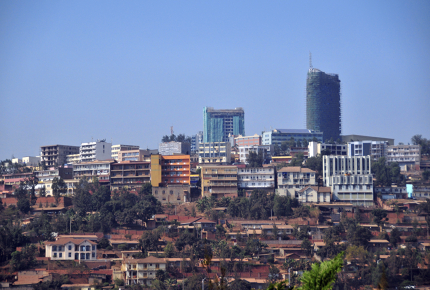 Kigali's growing skyline reflects Rwanda's lofty ambitions
Kigali's growing skyline reflects Rwanda's lofty ambitionsMtcurado / Thinkstock
I see one brave soul who isn’t letting the weather defeat him: a soggy cyclist, whose skimpy Lycra outfit offers scant protection from the elements. He cares not. Pedalling furiously uphill, his face is fixed with the expression of determination you see on most cycling enthusiasts, yet he is quite unlike any other rider I have seen because he only has one leg.
“It was the genocide,” says Amos, half explaining what happened to his other leg.
This year marks 21 years since the Rwandan Genocide, a period of unparalleled carnage in which some one million Tutsis and thousands of sympathetic Hutus (the two main ethnic groups in Rwanda) were slayed by Hutu hardliners.
"He only has one leg."
Men, women and children were murdered in their homes, bludgeoned in churches and hacked down in the street. Nowhere was safe. Corpses littered roads, blood coursed through gutters and the smell of rotting flesh hung in the air. The madness lasted for 100 diabolical days.
You’d have to have a heart made of granite not to shed a tear in Kigali Genocide Memorial Centre, which, as well as paying tribute to victims of the slaughter, explains how the country slid towards genocide (the fingerprints of German and Belgian colonialists are everywhere).
Amidst the unremitting despair (there are 250,000 people buried in a mass grave outside), the museum tells stories of kindness and courage, which do at least send you home with some shred of faith in humanity.
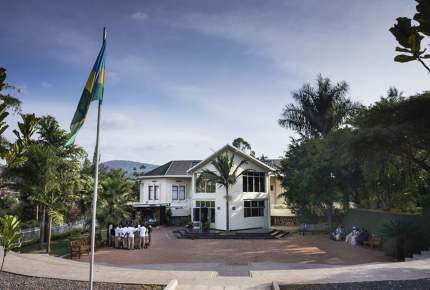 The Genocide Memorial Centre in Kigali
The Genocide Memorial Centre in KigaliAHMCPHERSON / Thinkstock
A new epoch
The 1994 genocide didn’t happen suddenly. The rhetoric on the radio, articles in the papers and hate on the streets preceded the slaughter. Those who could left the country before blood was spilled: clutching the few possessions they had, the poor walked across the border to Tanzania, Uganda and Kenya, while wealthier citizens escaped on planes to Europe and North America.
Whole generations of Rwandans grew up abroad, where they imbibed cosmopolitan cultures and received foreign educations. And now the diaspora is returning to the motherland to help build a new Rwanda.
“People have come back with new ideas, which has really made a difference to the city,” says Jean-Pierre Bizoza Sebageni, creative director at the Kwetu Film Institute. “It’s an exciting time for Kigali.”
The Kwetu Film Institute clings to the hills of Kigali, in a salubrious suburb known as Hillywood – a tongue-in-cheek reference to its silver screen credentials.
"It’s an exciting time for Kigali."
On the ground floor of the institute is a café, where hip young things sip lattes and edit movies on their laptops. This institute is the beating heart of Rwanda’s film industry, which is starting to gain international attention.
“I saw Clive Owen around here recently,” beams Jean-Pierre, who last month helped organise the 11th edition of the Rwanda Film Festival.
It’s not just Hillywood that’s booming. As visitors return to Rwanda, its tourism industry is flourishing and, if luxury hotels are the barometer for a city’s health, Kigali’s pulse is positively racing: Hilton, Sheraton and Radisson are all constructing 5-star resorts in the capital. New restaurants and cafés are also popping up.
But if you want a real sign of how far the city has come, consider the fate of Hôtel des Mille Collines, whose story inspired the film, Hotel Rwanda. During the genocide it harboured some 1,200 desperate inhabitants, protecting them from the carnage outside. Today it is owned by Europe’s oldest luxury hotel group, Kempinski, and has five stars above its door.
Lions roar again
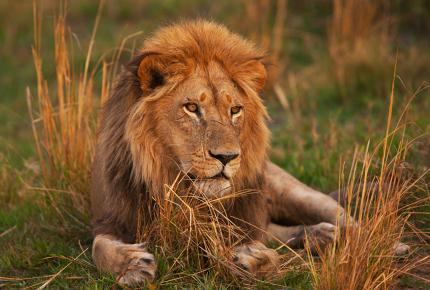 The roar of the lion can once again be heard in Rwanda
The roar of the lion can once again be heard in RwandaGleb_Ivanov / Thinkstock
While the seeds of change are being sown in Kigali, the breeze of optimism is carrying them across the country. Ambitious projects that once seemed impossible are now being realised, like the plan to reintroduce lions to Akagera National Park in eastern Rwanda.
Once abundant in the park, the big cats became extinct here after the genocide, when refugees returned from Tanzania and overwhelmed Akagera. Attracted to the park by its freshwater lakes and productive soil, they grazed cattle, felled trees and wiped out the local wildlife. Lions and rhinos disappeared. Other species teetered on the edge.
“At the time we were proud of killing the lions,” explains Emmanuel Kalisa, a farmer from Kageyo village on Akagera’s border. “They were killing our cows.”
Between milking his herd, Emmanuel tells me about the time he slayed five lions in a day. He explains how he and his friends laced the carcass of a cow with poison, how they killed four lions with the infected meat and how the fifth cat attacked one of his pals.
"We were proud of killing the lions."
“The lion tried to kill him,” he says, holding buckets of milk. “It crushed his arm.”
Emmanuel scurried up a tree while his friend speared the lion. Three of the farmers were injured, but they survived the attack and their tale of derring-do was told on the local radio that night.
A crucial detail missing from the report, however – one that nobody knew at the time – was that those lions were Rwanda’s last. Motivated not by malevolence, but a desire to simply protect their meagre livelihoods, Emmanuel and his friends had pushed the county’s lions to extinction.
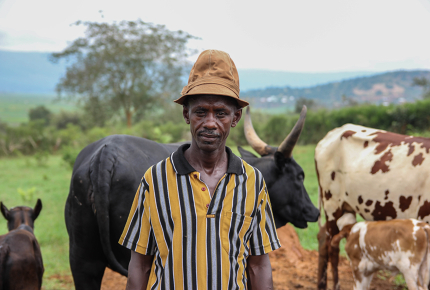 Emmanuel killed Rwanda's last lions, now he welcomes their return
Emmanuel killed Rwanda's last lions, now he welcomes their returnGavin Haines
But the king of the jungle returned to Rwanda last month, when six South African lions were relocated to Akagera (rhinos will follow next year).
Things will be different this time. After resettling refugees outside the park, the Rwandan government appointed African Parks to restore Akagera to its former glory. The non-profit organisation has since erected a fence around the 1,122 sq km park (433 sq miles) to reduce human-wildlife conflict and conducted outreach projects in nearby villages to engage and educate local communities.
“We have a fence and we have had assistance from the park building schools and other projects,” says Emmanuel. “We are happy.”
"Things will be different this time."
Sadly, there are no big cats to be seen when Amos and I visit the park, but wildlife is not in short supply. Cruising through the hills we see zebra and bushbuck grazing in the long grass and watch as a black mamba, the most dangerous snake on Earth, slithers through the scrub.
At Lake Ihema we watch crocs sun themselves on the shore, while a lone bull elephant emerges from a cooling dip in the water. Suddenly there are dozens of them: elephants of all ages, moseying through the undergrowth, grazing on the greenery.
Africa Parks reckon Akagera was a decade away from total destruction, but from the depths of despair it has emerged as vibrant and full of life as ever. It’s Rwanda in a microcosm.
NEED TO KNOW
Ethiopian Airlines (www.ethiopianairlines.com) fly from London to Kigali via Addis Ababa. Return tickets start from £650. Gavin travelled around Rwanda with Tribes Travel (www.tribes.co.uk), which can organise bespoke tours of Rwanda and neighbouring Uganda.
Published: 12 Aug 2015
Do you have any Feedback about this page?
© 2026 Columbus Travel Media Ltd. All rights reserved. No part of this site may be reproduced without our written permission, click here for information on Columbus Content Solutions.






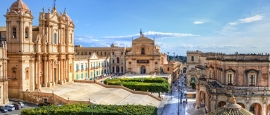


 You know where
You know where